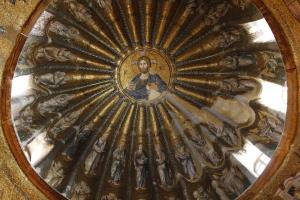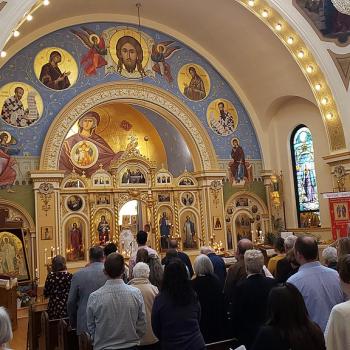
Through both Mary (as his mother), and Joseph (as his legal guardian/father), Jesus found himself connected with a great, indeed, marvelous family line, one which was central to and at the forefront of the history of the people of Israel. In his humanity, he is the successor or son of David, and the prophecies concerning David’s heir are fulfilled in and through him.
The holy ancestors of Christ, the men and women who came before him in the family lines attributed to him, were men and women who found themselves connected with God in a variety of ways. Acknowledging them and their closeness to God should not make us presume that they were perfect, because they were not; nonetheless, they were saints, were friends of God, despite the fact that they were also sinners who often found themselves judged for the evils they had done. David, though a man and king loved by God, was condemned for the way he had treated Uriah the Hittite, having it so that Uriah would die in battle, for it was in this manner David would then be able to wed Uriah’s wife, Bathsheba. There were some, especially women like Ruth, who were of such extraordinary loyalty and determination, such grace and high moral virtue, that we can only marvel when we read of them and their lives, but they are rare, as most in the line of Christ are of mixed virtue.
Men and women alike, saints and sinners, oppressors and the oppressed, all find themselves in the line of Christ; each of them had something special about them, something special which was passed down the family line and was taken up by Christ when Mary conceived him in her womb: she gave the heritage of her family line to him, and he took it, willingly, and made it his own, so that in it and through it, we can see the variety of ways God works with humanity in order to save it. Sinners and oppressors repented; saints and the oppressed found God comforting them, helping them through their struggles — and we, too, find the mix of both in ourselves, as we are at once oppressors insofar as we sin and the oppressed insofar as we experience the fall impact of sin and the structures of sin on our lives.[1]
We should be drawn by the great faith of those who were in the line of Christ, for it is that faith which motivated them, which pricked their conscience, allowing them to repent and be justified whenever they grievously sinned. Such justification did not mean they did not have to face the consequences of their sin, for their infidelity to God and God’s expectations for them, but it was their faith which allowed them to know that when they truly repented, God, with great love, would show mercy and help them, making sure their faith, and not their sin, had the last word.
As the author of the Book of Hebrews attests, we must not look to the holy men and women of God as individuals who set out to live their lives for God, and received the fullness of God’s promises in their lives apart from others; rather, the fullness of God’s promises is communal, not individual, and its fulfillment is found in the full community of God, which includes us: “And all these, though well attested by their faith, did not receive what was promised, since God had foreseen something better for us, that apart from us they should not be made perfect” (Heb. 11:39-40 RSV).
The family line of Christ, the ancestors of Christ, found that their expectations and desires were fulfilled by Christ. We, likewise, should find the same to be true for us. He took on humanity and made it his own. We are all joined together in that humanity, and so joined together in him. Apart from him, we will not be able to experience the fullness of God’s promises. That means, we cannot experience them apart from experiencing them in common with each other. We are in this together; we will find our fulfillment as we find ourselves united and made one in Christ. If we try to set ourselves apart, if we try to receive the promises of God for ourselves apart from the rest of humanity, we will never receive them in their fullness; it is only when we die to the self, die to the attempt to such individualization apart from our common humanity, do we find our true place in Christ. When we try to set ourselves apart from others, we fight against God, and in that fight, we will find God’s condemnation, not because God hates us, but because God hates the sin which we establish in the wake our are Satanic attempt to lift ourselves above our common humanity. David, Solomon, and so many others who were truly great, suffered great setbacks because they believed in their own greatness and attached themselves to it, using it to set themselves apart from others; and yet, when they humbly repented, it is then they truly realized their greatness because it was then when they realized their place in God, and with it, showed true fidelity or faithfulness to God.
We must live by faith. We must open ourselves up to God, and be faithful to him. We must heed the message of the Gospel. We must die to the self in order to engage God and the world in love. Insofar as we do so, we will find ourselves living out the faith. But insofar as we try to lift ourselves up and put others down, we do not follow the good examples we can find in the lives of the saints. Rather, we end up following their bad examples. Like them, we will have to face the consequences of our infidelity. But if we have faith, we will, like David, accept what comes our way as a result of our sin, pray to God, not only with due penitence but in love, recognizing that once our sin is expiated, we can truly return to God and God will listen to us, acknowledge us, and help us as we struggle to find our proper place in the world. Truly, if we want to receive the full promises of Christ, we must remember we cannot have it by ourselves. It is found when we join ourselves together with the rest of humanity, in a communion of love. Then, we shall see the glory of Christ come to us and lift us up, making us joint-heirs with him, as we find ourselves partakers of the divine nature.
[1] Obviously, we are not equal in our sin, nor are we all equally oppressed by the structures of sin. Those who unjustly suffer the most, those who are neglected by society, the weak and poor, are those who are to be raised up as being the first in the kingdom of God.
Stay in touch! Like A Little Bit of Nothing on Facebook.
If you liked what you read, please consider sharing it with your friends and family!












